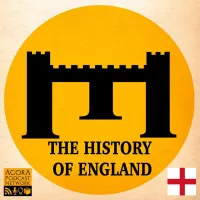View Transcript
Episode Description
Stephen Wild and I have a simple, but we think noble ambition: to find the Greatest of the Welsh Rulers, and to do so by democratic means. We whave selected 12 of the finest candidates, from Macsen Wledig (4th C) to Owain Glyndŵr (15th C). I don’t think it makes much sense to explain the rules of how we selected them and why not Henry Tudor, you’d only argue.
Greatest Ruler of Wales: Episode One 350AD to 1066
Welcome to our search for the Greatest Ruler of Wales. In these two Podcasts, Stephen aims to introduce some of the leaders who shaped Medieval Welsh History. Along the way, We’ll give a very succinct survey of the history of Roman and Medieval Wales. In this episode, we cover the period from 350 AD, to 1066, and rulers Macsen Wledig, Cunedda, Cadwallon ap Cadfan, Rhodri Mawr, Hywel Dda, ‘The Good’, and Gruffudd ap Llywelyn.
Download Podcast - The Greatest Welsh Ruler Part I (Right Click and select Save Link As)
The Greatest Ruler program
So, this is the program:
We (almost entirely Stephen as it happens) is going to take you through a brief history of Medieval Wales, including the lives of our 12 candidates, in two podcast episodes on 7th and 14th September
- 15th September: Voting Opens for Round one, the Group Round
- 21st September: Voting for the Semi Finals 1
- 22nd September: Semi Final 2
- 23rd September: The Final!
- 24th Sepember: The Big Announcement
The Draw
Stephen’s Pronunciation guide
Welsh is (very nearly) phonetic in its spelling, unlike English, but the conventions of spelling are rather different. Here’s a list of names, rendered (very approximately) into an English equivalent. Stress, in Welsh, is on the penultimate syllable.
- Macsen Wledig – Macsen ooLedig
- Cunedda – Kinethah (voiced ‘th’ as in ‘that’)
- Cadwallon – Kadwa*ll*on (the ‘ll’ in Welsh doesn’t occur in English. Put your tongue where it would be to say ‘l’, but blow instead!)
- Rhodri – like the English Rodry, but sound the ‘h’ at the same time as the ‘r’.
- Mawr – ma-oor (with a rolled ‘r’ )
- Hywell – Huh-well
- Dda – thah (but with a voiced consonant – as in ‘Cunedda’, above)
- Gruffudd (and Gruffydd – same pronunciation) – Griffith (voiced ’th’)
- Llywelyn – ‘Ll’ as in Cadwallon. Lluh-wel-in
- Owain – Oh-wine
- Rhys – Rees, but with a sounded ‘h’ with the ‘r’
- Gwenllian – Gwen-llee-ann (see above for ‘ll’)
- Iorwerth – Yor-werth (with rolled ‘r’s)
- Glyndŵr – Glin-door (‘oo’ as in spooky)
Stephen’s Book recommendations
All of these are general interest history – nothing too academic, I think – and are all in English(!) There’s plenty more to read out there, both in Welsh and in English, as well as recent books I haven’t bought (yet).
- John Davies’s excellent ‘A History of Wales’ is a wonderful overview.
- David Ross’s ‘Wales – History of a Nation’ is easy to read and gives a clear timeline.
Also recommended
- David Walker’s ‘Medieval Wales’
- Kari Maund’s ‘The Welsh Kings’
- Roger Turvey’s ‘The Welsh Princes 1063-1283’
If you want something a bit more argumentative, you might like to try:
- Gwyn A. Williams’s ‘When Was Wales’ and
- Martin Johnes ‘Wales: England’s First Colony’.





